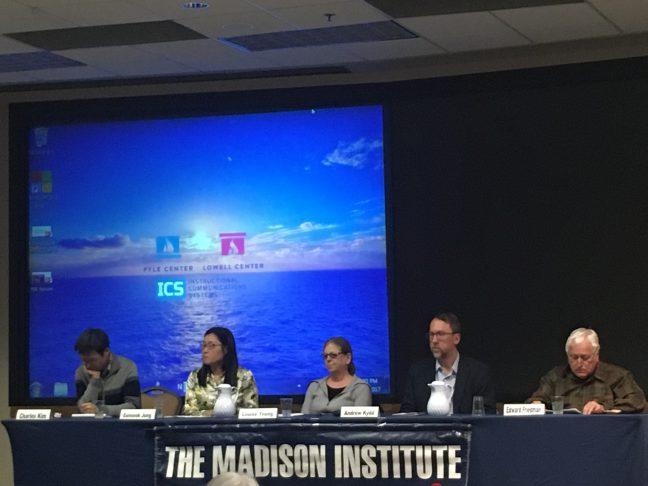The center for East Asian Studies and the Madison Institute held a discussion Monday about the military and communications crisis in North Korea in relation to Chinese and United States’ affairs.
The panelists spoke about how North Korea won’t give up nuclear weapons because that is the only thing giving them power, therefore they won’t sign any international peace treaties.
Charles Kim, an associate professor of Korean studies, said nuclear weapons in North Korea is the way North Korea keeps its capability of maintaining power and overall survival.
“North Korea is pursuing nuclear weapons in order to have prestige,” Kim said.
Native American community members of Madison discuss how treaties have exacerbated inequalities
He described three possible ways the United States could intervene in withholding North Korean threats:
- Hard-liner hawk approach: a pre-emptive strike
- Hard-liner boas approach: having more sanctions both bilateral and multilateral
- Soft-liner approach: using sanction diplomacy to create a peace treaty for denuclearization
These are the current reviews of approaches to the “North Korean problem,” Kim said.
Although the soft-liner approach is not currently being used, if it should succeed diplomacy will need to make progress towards having denuclearized because sanctions alone won’t work, Kim said.
Eunsook Jung, an undergraduate program coordinator in the department of political science described South Korea’s reliance on the U.S. for protection against North Korea because they haven’t shown much autonomy for security.
UW Hillel hosts discussion about sexual assault on campus, in Jewish community
President Dae-Jung Kim of South Korea from 1998 to 2003 created the Sunshine Policy to unify South and North Korea which would deny armed provocation by North Korea, Jung said.
The next president, Moo Hyun Roh, continued the policy and offered North Korea $3,000 per South Korean person, if they agreed to have denuclearization, Jung said. This policy, however, was ended when conservatives came to power in South Korea.
“It’s important to be rational,” Jung said. “It’s important to accept North Korea is a nuclear state, and that the deterrence policy is the best way to go.”
Journalists find difficulties in remaining neutral in health care reporting, panelists say
Professor of history Louise Young, said North Korea never agreed to pay reparations to Japan and Japan never normalized their relations with North Korea. There is a lot of antagonism towards North Korea from Japan, due to mutual hostility.
This can change the remilitarization and renuclearization of Japan, Young said. After being bombed by nuclear weapons themselves, Japan has been part of the push for peace with nuclear weapons. But with the threat of North Korea, there has been more discussions about building up their weaponry.
Professor of political science Andrew Kydd said security is a main concern to North Korea. Their weaponry is like their insurance. Because they’re surrounded by strong and rich states – without weapons – they immediately lose their power.
To stop North Korean threats, Kydd said President Donald Trump is currently trying to pressure China into pressuring North Korea into denuclearization, but they aren’t willing because they are fed up with Western capitalism.
Other ways to stop North Korean threats include sanctions, deterrence through war or through negotiations, but Kydd said there is no room to negotiate.
“[The United States] would like the [Democratic People’s Republic of Korea] to cease to exist,” Kydd said. “We’re simply going to have to live with the fact that North Korea has nuclear weapons.”

















